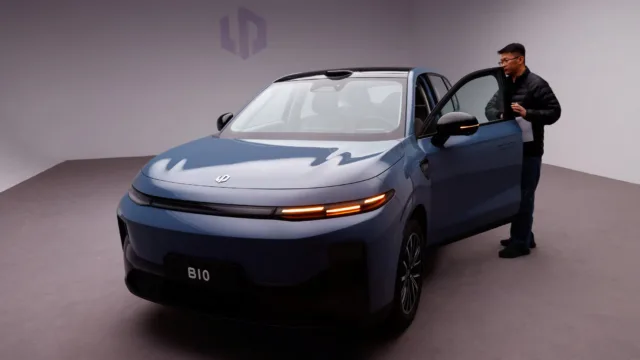
Chinese electric vehicle brand Leapmotor has started offering the UK’s cheapest battery car after reducing its prices in line with a new government grant — despite being unlikely to qualify for the discount.
Its price cuts of £1,500 and £3,750 are the same levels as the grants offered by the government under a scheme intended to persuade consumers to purchase battery cars, but with conditions that are specifically tailored to prevent Chinese brands qualifying.
It cut the price of its cheapest model, the To3 small electric car, by £1,500, making it the most affordable EV on the UK market, below the Dacia Spring, which is also built in China and sells for £14,999.
Leapmotor’s C10 sport utility vehicle would also come with a £3,750 discount, bringing its price down to £32,750, the company said on Friday.
The established car industry has long warned that Chinese importers will be able to absorb any tariffs or cut their prices while still making profit on their vehicles, because they can build cars more cheaply in their domestic factories.
While any price war sparked by its move would benefit consumers, it would harm the European industry that is still struggling to eke out margins on EVs that are comparable with petrol or diesel cars.
Leapmotor is a new brand from China, but sells cars internationally through a joint venture with Stellantis, owner of the Vauxhall, Peugeot and Jeep brands. It currently builds its models in China, though plans in time to use Stellantis plants in Europe to assemble its vehicles for the region.
UK director Damien Dally said Leapmotor aimed to compete “in the strongest position”, regardless of whether its Chinese-built models have access to the government’s £650mn grant.
Whether its cars are allowed to receive the new grants is “the magic question”, he said. “If we qualify then fabulous, if we don’t, then . . . we did the right thing today.”
Chinese carmakers such as BYD have been rapidly expanding in the UK and other European markets with affordable electric vehicles that are equipped with advanced software.
Leapmotor entered the UK in March and has a 0.1 per cent market share, while BYD has 1.9 per cent and Chery’s Omoda and Jaecoo brands have 1.5 per cent, according to figures from trade group the Society of Motor Manufacturers and Traders.
Dally said the new subsidies were “very much needed” in the UK to boost both retail demand as well as interest in EVs, but warned that they also leave the industry “in a limbo” and create “a lot of confusion in the short term”.
“I’m entering the big month, which is September, so we needed to position ourselves in the strongest position we possibly could, which is why we’ve done what we’ve done,” Dally said. “Consumers need confidence.”
While Leapmotor unilaterally cuts the price of its vehicles, European and Asian carmakers are struggling to figure out which of their models are eligible for what part of the subsidies, which were created to boost retail demand for EVs following intense lobbying by the industry.
The cars considered “greenest” will receive a discount of up to £3,750 per vehicle when they buy a new electric car that is priced less than £37,000, while others in a lower band will receive up to £1,500.
A third band that includes most Chinese-made cars will not receive any subsidy — and has been labelled by some industry executives as “backdoor tariffs” for Chinese EVs.
One government official welcomed Leapmotor’s move, describing it as “good news for the consumer”.
Many carmakers have held off from promoting the discounts until there is clarity on which models are eligible for the high band.
Dally said its discounts would be reviewed at the end of September, but the company hopes to continue them until the year end. He said the company could not continue the discount “indefinitely”, but stressed that the UK market was “very, very, very important” for the company.
Leapmotor’s move could spur a pricing war even before the grant is distributed to carmakers. Applications started earlier this week but it is likely to take weeks before companies are told the eligibility of their models.
Dally forecasted that consumers expecting the new £3,750 discount could be disappointed if most of the subsidies are in the £1,500 range.
Separately BYD, which is the world’s largest EV producer, said it welcomed the EV grant. “Like other car brands, we have informed the Department of Transport of our intention to make an application for inclusion in the electric car grant scheme and look forward to being part of it,” said Bono Ge, BYD’s head of UK operations.
A spokesperson for the Chinese embassy in the UK called on the government to ensure “an open, fair, just and non-discriminatory environment for the investment and operation of businesses from all countries, including China”.
“Exclusive policies and protectionism are by no means conducive to the development of the electric vehicle industry,” the spokesperson said, adding that the embassy would “resolutely safeguard the legitimate rights and interests of Chinese companies”.









